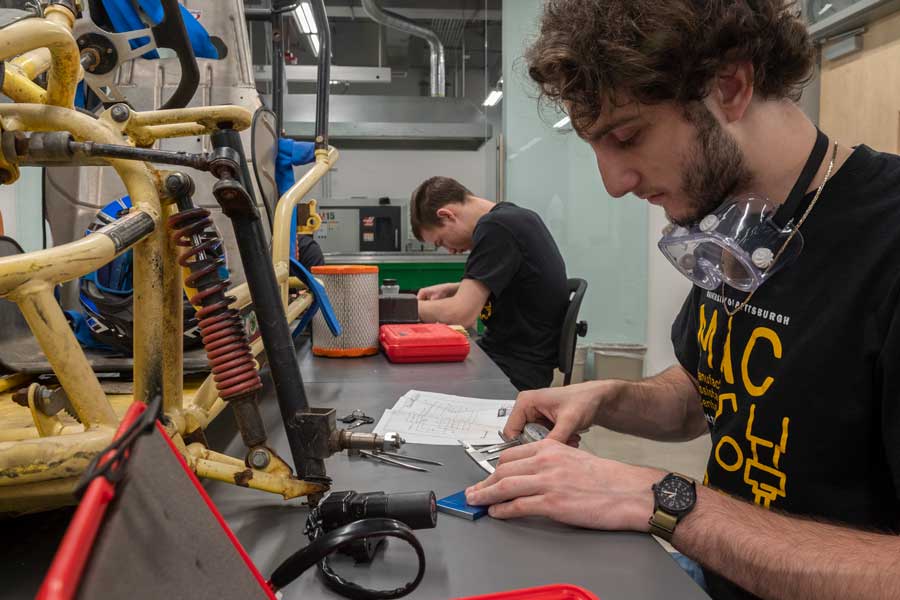Engineering students learn machining
12-week lab opens up summer job opportunities for students

University of Pittsburgh at Bradford engineering technology students became trained machinists and CNC operators this summer thanks to the university’s partnership with their associated campus in Titusville.
Three students who hope to one day be designing items for production joined a spring 2023 graduate and their professor, Aaron Straus, to drive three days a week to the Pitt-Titusville campus, where Pitt’s Swanson School of Engineering has its Manufacturing Assistance Center.
The three students spent 12 weeks learning how to shape metal parts both manually and by using computer-controlled machines such as those available in the George B. Duke Engineering and Information Technologies Building on the Bradford campus.
While Bradford campus’s metal shop is setup for students to be able to design, fabricate and scientifically evaluate engineering projects, the Titusville MAC center is ideal for focused trade instruction. The Titusville campus can accommodate multiple regiments of students and has a veteran machinist instructor, Roberto Rincon, on staff to instruct the students.
The students’ work in Titusville served as a lab for the six-credit college classes that would also teach them about how to research machinist positions, create engineering drawings and manage fabrication projects.
The three mechanical engineering technology students, Stephen Diehl of Butler, David Niegowski of Bradford and Raymond Worsen of Sharpsburg, learned how to draw and read blueprints, researched the history of various machines, explored and practiced machining techniques, then learned how to program the CNC machines.
By July, they were designing, drawing and outlining work plans to fabricate their own projects, which included a small bench, an heirloom pen, night-vision goggles and a specialized, machinist hammer.
“I told them, ‘The sky’s the limit,’” Straus said of his project instructions, “but students had to be able to draw the individual components of the assembly, outline the work scope, which included what metal stock, tools and machines were needed, and calculate the overhead price for manufacturing their design.”
Although the three mechanical engineering technology students deferred a summer of earnings by taking the class, next summer they should be able to apply for machinists’ positions making between $18 to $25 per hour and helping local industries, said Straus.
If they choose to work as machinists next summer, the student engineers will gain even greater understanding of manufacturing processes and workflows.
In the meantime, they’ll be able to put their new machining skills to work building an off-road vehicle this fall as the university enters its first BAJA SAE competition run by the Society of Automotive Engineers.
Matt Copfer, a spring 2023 sociology graduate also took the machining and CNC classes. While he won’t be able to build Pitt-Bradford’s BAJA car in the fall, he’s looking forward to his new job as a machinist with Zeyon Custom Engineering in Erie.
Combined with his bachelor’s degree in sociology, Copfer hopes to be able to become a manufacturing supervisor someday. What he’s looking forward to the most right now, however, is weekends off, something he hasn’t experienced in while working and studying machining-trades full-time.
For more on the Manufacturing Assistance Center at Titusville, visit www.titusville.pitt.edu/MAC. For more information on mechanical engineering at Pitt-Bradford, www.upb.pitt.edu/mechanical-engineeringtech.